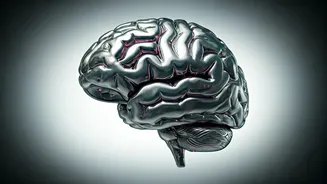Embrace Omega-3s
Omega-3 fatty acids are paramount for brain health. Dr. Chadha emphasizes the significance of these nutrients, rating their importance at 6/10. Incorporating
omega-3s into your diet can significantly improve cognitive function. These fatty acids play a vital role in the structure and function of brain cells. Consider consuming foods rich in omega-3s, such as fatty fish like salmon, flaxseeds, and walnuts, or explore supplements. Regular intake can support memory, focus, and overall brain performance. Ensuring an adequate intake of omega-3s is a proactive step towards long-term brain health and cognitive resilience.
Prioritize Physical Activity
Regular physical activity is another crucial element for brain health, earning a rating of 9/10 from Dr. Chadha. Engaging in exercise benefits both the body and the mind. It enhances blood flow to the brain, which is essential for delivering oxygen and nutrients. Physical activity can stimulate the growth of new brain cells and improve cognitive functions such as memory, attention, and executive function. Aim for at least 30 minutes of moderate-intensity exercise most days of the week. This includes activities like brisk walking, jogging, swimming, or cycling. Regular exercise is a powerful tool for maintaining and enhancing brain health, promoting both physical and mental well-being.
Master the Art of Meditation
Meditation stands out as a highly effective practice for boosting brain health, receiving a perfect score of 10/10. Meditation is a potent tool for reducing stress, improving focus, and enhancing cognitive function. Regular meditation can promote the growth of new brain cells, improve attention span, and enhance emotional regulation. Incorporate meditation into your daily routine, even if it's just for a few minutes each day. There are many meditation techniques, from guided meditations to mindfulness practices. Meditation provides a pathway to a calmer, more focused, and healthier mind, fostering overall mental well-being.
Cultivate Social Bonds
Strong social connections are essential for brain health, also rated at 10/10. Maintaining a robust social life stimulates cognitive function and protects against cognitive decline. Interacting with others, engaging in conversations, and participating in social activities provides mental stimulation. Social connections foster a sense of belonging, reduce stress, and can improve mood. Make an effort to nurture your relationships by spending time with friends and family, joining clubs, or volunteering in your community. Strengthening social connections is a proactive step toward maintaining a healthy and vibrant mind, crucial for emotional and cognitive well-being.
Nourish with Food
Avoiding processed and sugary foods is another critical habit for promoting brain health, also with a score of 10/10. Processed foods often contain additives and preservatives that can negatively impact brain function. Excessive sugar intake can lead to inflammation and impair cognitive performance. Focus on a diet rich in whole foods, including fruits, vegetables, lean proteins, and healthy fats. Limiting processed foods, sugary drinks, and excessive sugar intake can protect the brain from damage. A nutritious diet provides the brain with the essential nutrients it needs to function optimally, supporting long-term cognitive health and overall well-being.
Embrace Lifelong Learning
Learning a new skill is vital for brain health, also receiving a score of 10/10. Engaging in new learning activities stimulates the brain, creating new neural pathways and improving cognitive function. Learning something new challenges your brain and keeps it active. This could be anything from learning a new language or musical instrument to taking up a new hobby or attending a class. Continuously learning new skills provides mental stimulation, sharpens memory, and keeps your brain active and engaged. By embracing lifelong learning, you can maintain cognitive agility and promote brain health throughout your life.




















